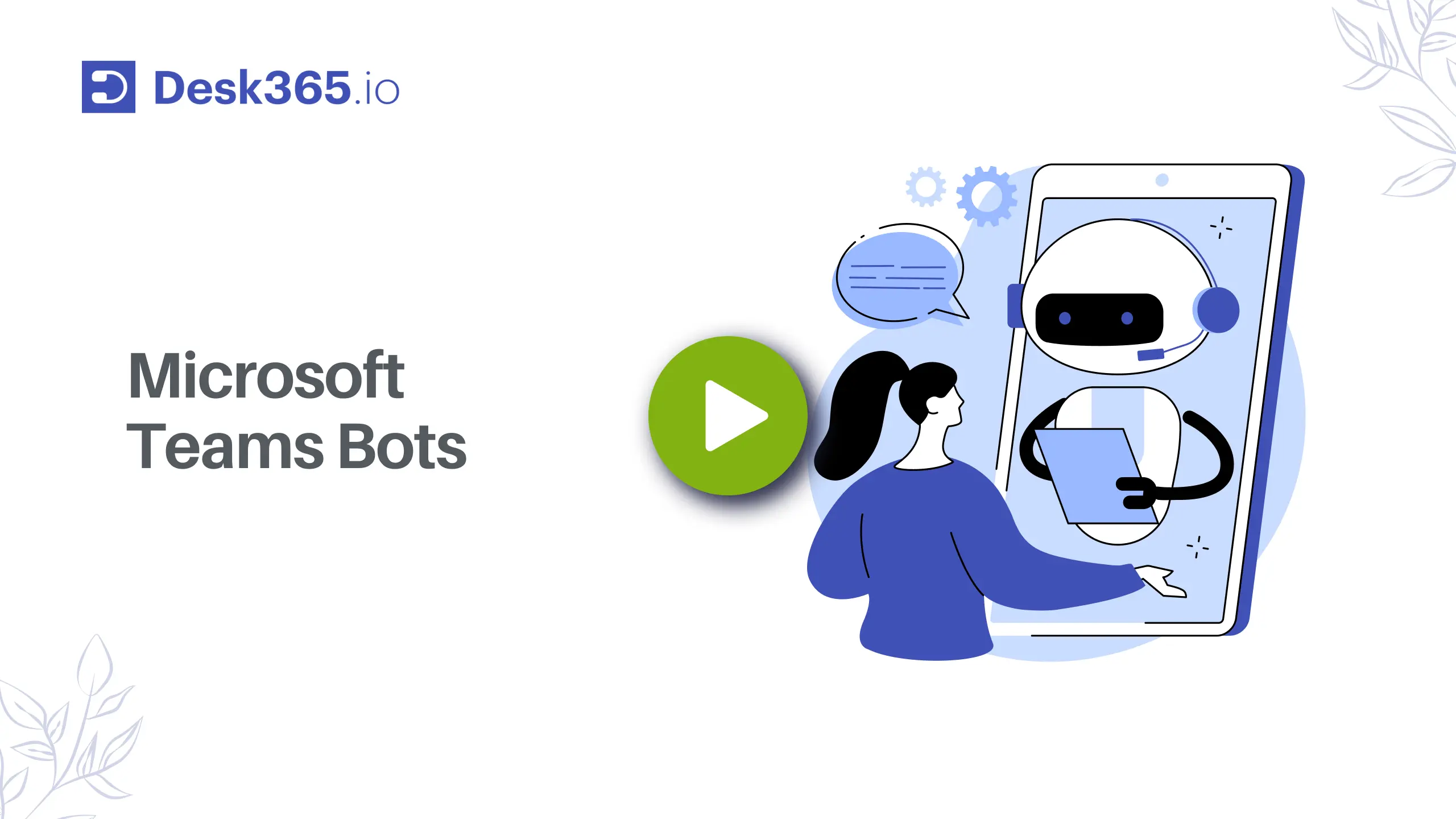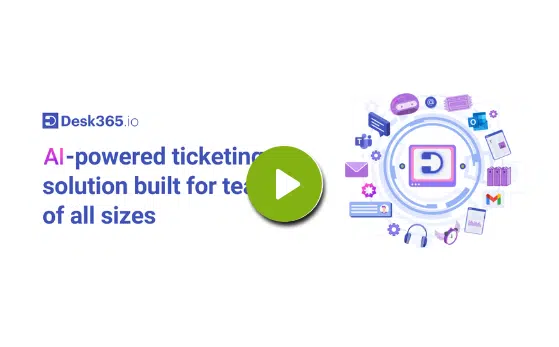If you’ve been in IT long enough, chances are you’ve either read ManageEngine ServiceDesk Plus reviews or at least heard about it in passing. It’s one of those names that comes up often when teams are evaluating IT service management (ITSM) tools.
ServiceDesk Plus, from Zoho’s ManageEngine suite, is designed to be more than just a ticketing system. It promises a complete ITSM experience, covering incident, problem, and change management, along with asset tracking, CMDB, and more. For some companies, that “all-in-one IT department in a box” approach is exactly what they need. For others… well, the reality is a little more complicated.
In this blog, we’ll focus specifically on ServiceDesk Plus, cut through the marketing, and look at what real users are saying—the good, the bad, and where it stacks up against more streamlined helpdesk solutions like Desk365.
What is ManageEngine?

ManageEngine focuses on building IT management software for businesses of all sizes. It’s used by enterprises, mid-sized companies, and government agencies that need a mix of on-premises and cloud-based tools.
Recommended Reading: Why Should You Use a Cloud-Based Helpdesk?
It is basically the Swiss Army knife of IT tools. Instead of buying one product for helpdesk, another for network monitoring, and another for identity management, you get them all under one brand.
Key product categories
IT Service Management (ITSM)
- ServiceDesk Plus – Ticketing, change management, asset tracking.
- SupportCenter Plus – External customer support software.
IT Operations Management (ITOM)
- OpManager – Network/server monitoring.
- Applications Manager – App performance monitoring.
- Site24x7 – Website uptime and performance tracking.
IT Security Management
- ADManager Plus – Active Directory management.
- ADAudit Plus – AD auditing and compliance reporting.
- Log360 – SIEM solution.
- Endpoint Central – Endpoint management, patching, remote access.
Endpoint Management
- Patch Manager Plus – Patch automation for OS/apps.
- Mobile Device Manager Plus – MDM for BYOD and corporate devices.
Identity & Access Management
- ADSelfService Plus – Self-service password reset.
- Password Manager Pro – Team password vault.
Analytics
- Analytics Plus – IT analytics dashboarding.
Sounds great, right? And honestly, it is for the right type of company. Let’s look at ManageEngine’s ServiceDesk Plus and how real users feel.
What is ManageEngine ServiceDesk Plus?

ServiceDesk Plus is ManageEngine’s dedicated IT service management software. Designed for IT teams in enterprises, government agencies, and education, it offers on-premises, cloud, and hybrid deployment options.
It comes in multiple editions:
- Standard – Basic helpdesk with incident management.
- Professional – Adds asset management.
- Enterprise – Full ITIL suite: problem, change, release, and CMDB management.
In short, it’s built for organizations that need more than just ticketing, it’s a full ITIL-aligned service desk.
ServiceDesk Plus at a Glance
Quick Summary (TL;DR)
| Pros | Cons |
|---|---|
| Brings structure and efficiency to ITSM | Clunky, outdated UI |
| Reliable tool used for 10+ years | Steep learning curve; confusing workflows |
| Full ITSM suite: Incident, Problem, Change, Asset Mgmt | Knowledge base & search are weak |
| Free version available for nonprofits | Sluggish performance; slow to customize |
| Highly customizable, flexible workflows | Mixed support experiences; long delays |
| Responsive support staff for smaller orgs | Not ideal for lean, modern IT teams |
ManageEngine ServiceDesk Plus reviews: What users love
Across G2, Capterra, Gartner, and even good old Reddit, a few strengths keep coming up.
1. Brings structure and efficiency to ITSM
Many users highlight that ManageEngine ServiceDesk Plus helps bring order to complex IT operations. One Gartner reviewer mentioned their “overall experience with SDP has been exceptional,” praising its ability to add structure, visibility, and efficiency across three different instances, with strong support from the product team.
“Our overall experience with SDP has been exceptional. The platform has bought structure, visibility and efficiency to our IT Service management since we have 3 instances and being a sinf=gle implementer, it is being so fun and exciting…”
2. Solid, reliable tool over the long haul
Another Gartner review describes using SDP for over 10 years across multiple companies, calling it solid and dependable, particularly for core ticketing needs.
“I have been using and managing SDP for the past 10+ years, started with the free edition and am now managing the full enterprise version. It is very easy to configure and manage. Getting good support on configuration and managing the tool. “
3. Feature-rich ITSM suite
On Reddit IT technicians call it “one of the best ticketing tools” with helpful features like Asset Management, Change Management, and Problem Management, plus instant reporting
“I will say that it is really a swiss army knife though. You can segregate ticket queues easily, set up automation and ticket flows, easily set up approval steps, and change management.”
4. Support for smaller organizations and nonprofits
A Capterra reviewer appreciated the free version available for nonprofits, noting it’s been “most helpful” in supporting ITSM at a small scale and commending the responsive support staff.
“ServiceDesk Plus has a free version available to my non-profit and has been most helpful in support ITSM for a small organization.”
5. Customizable and flexible
Several users recognize its customization as a strength. A Reddit reviewer pointed out that while it can take time, “there are some nice flows and automations that can be set up.”
“Was not a fan of how slow the product felt, each action seemed to sluggish. There were some nice flows and automations that could be set up but it takes time. I tend to find ManageEngine products to be similar, customizable in some areas that are useful but not in many others..”
What users struggle with ?
This is where things get interesting, because the criticisms aren’t one-off complaints, they’re themes.
1. Clunky UI and user experience
Multiple reviews call out the interface as outdated and not intuitive. One Reddit review said the product “felt sluggish” and “not modern,” while another Capterra user suggested the UI “could be more user friendly.”
“ It’s overall a little bit sluggish. It used to be pretty snappy but it feels like they’re going flashy over function, adding all kinds of useless animations.”
“The UI of the application can be improved so it can become more user-friendly.”
2. Complexity and confusion
Some users find the system overly complicated. In one detailed Reddit review the user noted that it’s often unclear whether to create a Task, Request, or Change Request, calling it a “nightmare to link” items compared to Jira.
“Too complex system, it’s unclear is the ticket should be created as a Task, as a Request or whatever. When you try to link a request with Change Request – it’s a nightmare to find a link location. After working with linked Jira tickets too much. Or, say, asset management – too many unnecessary fields.”
3. Knowledge base and search limitations
Several Capterra reviewers criticized the Knowledge Base as functional but weak, lacking robust features and poor integration with tickets.
“The Knowledgebase could use some work. While it is functional, it is not the most robust in features and doesn’t tie into support tickets very well.”
Others said the search functionality was “nearly useless” and couldn’t even locate tickets by requester name.
“The search function is nearly useless and if you have a LOT of tickets in the immediate archive, good luck finding it. The inability to search tickets by requester name is non-existent, the inline reply of ticket requests is extremely limited to the point that you might as well simply contact the client directly through your own company email rather than SDP itself.”
4. Performance quirks
Users report that operating tasks like ticket creation or navigating solutions pages can become painfully slow, sometimes taking up to 15 minutes for a single action.
Reports of the UI freezing, asset scans taking forever, or data in the database not showing up in the UI.
“I have ManageEngine ServiceDesk Plus running on a SLES 12 OES 2018 environment.
Recently, when users are creating tickets or if I am trying to check on solutions it can take up to 15 minutes for anything to happen.”
5. Support challenges
While some reviewers praised support, others had the opposite experience. A Reddit review noted that it works great until you need support, and a Reddit reviewer described long delays, saying issues often bounced between teams like an “Indian pinball.”
“For any of manageengines products you really get what you pay for. It works great, until you need support, in which case the call center helpdesk from India will never be able to assist you”
“lack of support (I had couple of issues and support did not respond me in weeks – yes, that time India was hit hard by Corona, but sales were fully available. No one even replied like “we acknowledged your issue, will come back later”). And when they come back it’s an “indian pinball” between teams and replies like “please restart all your systems”.
Breaking down real-world feedback – ManageEngine reviews
And here’s the thing, using ServiceDesk Plus rarely happens in isolation. For many companies, adopting it means stepping into ManageEngine’s full suite. So let’s look at what reviews say about ManageEngine overall.
ManageEngine is basically the Swiss Army knife of IT tools.
Need asset tracking? Check.
Need network monitoring? Yep.
Need a helpdesk? It’s in there too.
On paper, that sounds amazing. One login. One vendor. One contract.
But here’s the catch:
When a platform tries to do everything, some parts of it often feel… secondary. And that’s exactly the feedback many users share about ManageEngine’s helpdesk capabilities—it’s functional, but not always the most intuitive or agile option out there.
For organizations with dedicated IT departments, enterprise budgets, and a full team of admins, ManageEngine can be a powerhouse.
For everyone else, especially SMBs or fast-moving teams, it can feel like driving a 40-ton truck to deliver a pizza.
Let’s put some of the actual quotes in context.
“ManageEngine products seem to be about 80% complete.”
This comes from the feeling that the tools are powerful but lack polish, like they got most of the way there and stopped.
“I love ManageEngine, but I’d only recommend it if you’re going to fully buy into it.”
ManageEngine can be powerful and rewarding, but only if you’re ready to go all-in on setup, customization, and training.
“I reported an issue to ManageEngine on an easily exploitable data leakage vulnerability more than a year ago… a year later… provided me a patch for this vulnerability. This patch did not work and the next release… did not contain the fix. I now find myself again trying to get some mitigation on this…”
A user reported a serious vulnerability that remained unresolved long after multiple requests, clearly illustrating that critical issues may linger unresolved, even after many months and follow-ups.
“Great for the price, but you get what you pay for when it comes to support.”
A Reddit user pointed out that ManageEngine delivers reliable tools for ticketing, password resets, and more, but their support isn’t always top-notch.
Who should use ManageEngine? Insights from ManageEngine reviews
From all the reviews and feedback, here’s the bottom line:
ManageEngine makes the most sense if you are:
- Managing a large, complex IT infrastructure.
- Comfortable with on-premises deployment or hybrid setups.
- Willing to invest time in learning and customizing the system.
- Looking for a single vendor to cover multiple IT functions.
If you’re a two-person IT team, or you just need helpdesk ticketing, you might be better served by something lighter. That’s where Desk365 comes in.
ManageEngine vs Desk365
If ManageEngine ServiceDesk Plus is like a big corporate IT toolkit with robust, feature-packed, but a little heavy, Desk365 is more like the tool you actually want to use every day: lightweight, sharp, and built for speed.
ServiceDesk Plus is designed as a full ITSM solution with modules for incident, problem, change, and asset management. Desk365, on the other hand, focuses on what IT and support teams spend most of their time on: fast, seamless ticket management and customer support.
How they compare?
| Feature | ManageEngine | Desk365 |
|---|---|---|
| Scope | Full ITSM suite (incident, problem, change, asset mgmt.) | Cloud-based helpdesk for IT & customer support |
| Setup | Can take days/weeks | Ready in minutes |
| Learning Curve | Steep; workflows feel complex | Minimal; intuitive for new agents |
| Interface | Outdated & dense (per user reviews) | Modern & clean |
| Licensing | Edition-based + technician count | Simple per-agent pricing |
| Deployment | On-prem, cloud, hybrid | Cloud only |
| Best For | Large IT departments & enterprises | SMBs to mid-size IT & support teams |
What Desk365 users say?
Here’s what actual users have shared:
“Desk365 can be customized to your absolute liking. You can pull granular reporting, view and sort your tickets with ease and stay organized. There is so much automation, it’s very user friendly and easy to set up. We are so glad to have made the switch from Zendesk and we would not go back!”
Teams moving from Zendesk often find that while Zendesk is powerful, it can be slow to navigate and overly complex for straightforward support workflows. Desk365 strips away the bloat, allowing agents to work faster with fewer clicks. Custom ticket types, fields, and workflows can be set up in minutes, no consultant needed.
“Awesome. The interface is smooth. Key features are elegantly presented on the dashboard. Customer service is prompt and flexible.”
For many small to mid-sized IT teams, ease of adoption is critical. Desk365’s interface is intuitive enough that agents can start resolving tickets the same day they log in. Admin tasks like adding users, setting SLAs, or tweaking automations are equally straightforward, removing the bottlenecks common in larger platforms.
“The Microsoft Teams integration is a huge plus too. And honestly, you get all of this for a competitive price in a product that looks great and is super easy to use.”
Organizations already using Microsoft 365 love that Desk365 integrates directly into Teams. Tickets can be created, updated, and resolved without ever leaving the chat window. Real-time notifications mean no update is missed, and context switching between multiple apps is eliminated, boosting both response and resolution times.
Case study: MMRO’s switch to Desk365
MMRO, a healthcare organization, struggled with Zendesk’s rigid workflows and lack of flexibility. After switching to Desk365:
- They ran two separate helpdesks (internal IT + external patient support) without additional cost.
- Set up custom ticket types in minutes instead of hours.
- Stayed HIPAA-compliant using secure forms and processes.
- Completely eliminated SLA breaches.
These kinds of quick wins are hard to achieve with a heavyweight tool like ManageEngine, where initial setup and ongoing administration demand more time and technical expertise.
From the reviews, it’s clear that ServiceDesk Plus is a powerful ITSM suite. If you’re a large enterprise with a dedicated IT staff, it can be worth the investment.
If your priority is fast, simple, and efficient ticket management with minimal setup, Desk365 is the better fit. You’ll spend less time wrestling with the tool and more time actually solving problems. Start your 21-day free trial today.







